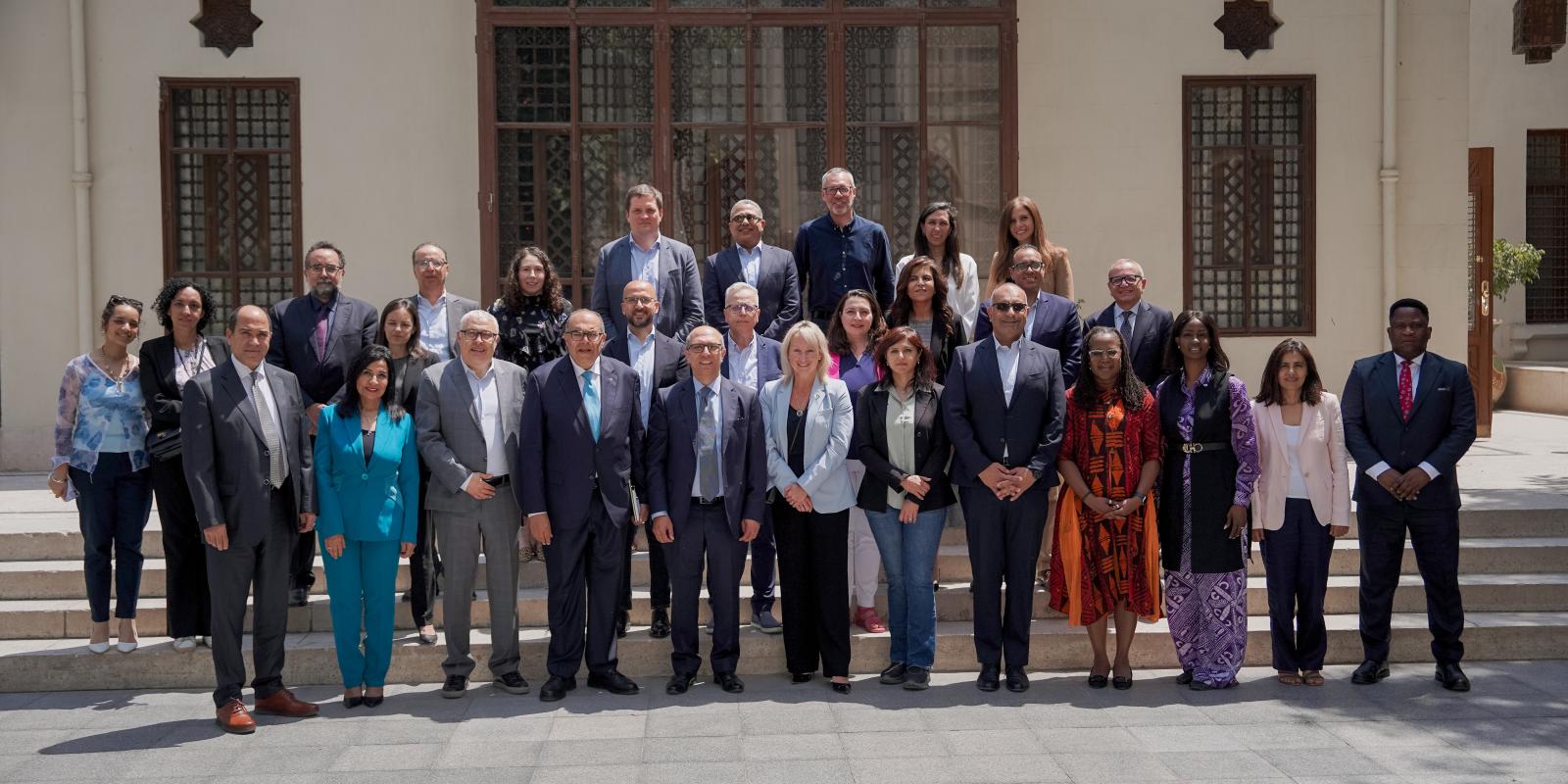
Africa Day 2025: Advancing African Business Education and Climate Leadership
On May 27, 2025, Onsi Sawiris School of Business at The American University in Cairo (AUC) marked Africa Day 2025 with a dynamic gathering that emphasized the continent's pivotal role in shaping the future of global business education.
Held at the historic AUC Tahrir Square campus, the event brought together thought leaders, academics and professionals to explore themes of collaboration, innovation, and sustainable development.
A Shared Commitment to Transformation
Organized in partnership with prestigious organizations, including the Association to Advance Collegiate Schools of Business (AACSB), Inside Business Education (IBE), Times Higher Education (THE) and the Principles for Responsible Management Education (PRME), the event highlighted a shared commitment to advancing business education across Africa and beyond.
“We convened Africa Day to celebrate the continent, foster serious dialogue on its pressing challenges and develop actionable, Africa-led solutions through collaboration between business schools and industry leaders,” shared Samer Attalah, associate dean for graduate studies and research at the Onsi Sawiris School of Business.
In the same vein, Dean Sherif Kamel stressed the importance of embedding climate and sustainability into education, noting, “The issues of climate change and sustainability should be seamlessly integrated in the learning experience of our students—otherwise, they risk remaining isolated silos."
Business Schools for Climate Change Africa
Moderated by Dina Abdel Fattah, assistant professor of economics and chair of the Mohamed Shafik Gabr Department of Economics at the Onsi Sawiris School of Business, this roundtable explored how business schools can embed sustainability into curricula, advance climate-focused research and equip graduates to address Africa’s climate challenges through responsible business practices.
Panelists emphasized the importance of tailoring climate education to reflect Africa’s unique environmental and economic realities, such as managing water scarcity, energy transitions and agricultural sustainability. Participants agreed that addressing climate change should be foundational in education strategies, with a focus on regional relevance to tackle Africa's specific environmental and economic challenges.
Collaboration between African institutions and global partners was also emphasized as vital for amplifying impact, pooling resources and sharing knowledge. Interdisciplinary collaboration with schools of engineering, environmental science and public policy was also emphasized as critical for providing students with a comprehensive understanding of sustainability challenges and opportunities.
Bridging the Skills Gap: Challenges and Opportunities
Moderated by Benjamin Stevenin, director of business schools solutions and partnerships at Times Higher Education, this session examined the disconnect between curricula in African business schools and the evolving demands of the job market.
With Africa’s youth population rapidly growing, panelists emphasized the urgent need for job-ready skills in digital literacy, sustainability and entrepreneurship. They highlighted the importance of university-employer partnerships, showcasing how internships and co-op programs prepare students for immediate impact in industries such as finance and technology.
Faculty development was also highlighted as essential, focusing on equipping educators to teach emerging topics and integrate vocational training into curricula. The session concluded with a call for African business schools to adapt swiftly, anticipating future workforce needs while driving innovation and resilience.
The Role of African Business Schools in a Fast-Changing World
The keynote address by Mahmoud Mohieldin, professor of economics and finance at Cairo University and United Nations Special Envoy on Financing the 2030 Sustainable Development Agenda, brought into sharp focus the challenges and opportunities facing Africa in an era of rapid change.
Mohieldin outlined the geopolitical shifts, digital disruptions and climate challenges reshaping the global economy, highlighting the dual responsibility African business schools have in preparing students to navigate these complexities. He emphasized that Africa, as a region, must not only adapt to the risks posed by climate change but also position itself to capitalize on the economic opportunities it presents.
The address highlighted the need for African business schools to act as proactive agents of change, equipping students to think critically and act decisively in uncertain environments. He called for values-driven education, prioritizing ethical leadership alongside technical and managerial expertise.
Collaboration and innovation were key themes, with Mohieldin urging schools to work closely with governments, industries and local communities to ensure their programs address real-world challenges. He concluded with a powerful message: African business schools must redefine their role as catalysts for sustainable development, shaping leaders who drive inclusive growth and resilience across the continent.
AI in Business Education Showcase
An engaging and interactive workshop led by Lakshmi Goel, dean of the School of Business Administration at Al Akhawayn University and Benjamin Stevenin, director of business school solutions and partnerships at Times Higher Education, explored how artificial intelligence is redefining the landscape of business education and the opportunities it presents for both students and educators.
The session demonstrated how tools like ChatGPT can enhance teaching and research by supporting tasks such as grading, providing personalized feedback and designing curriculum materials. These capabilities allow educators to focus more on student engagement and mentorship. Additionally, the session highlighted AI’s role in advancing interdisciplinary research, with examples of how it can simplify data analysis and enable predictive modeling for sustainability studies and business scenarios.
Embedding AI into curricula was identified as essential to prepare students for an AI-driven future. Ethical considerations, including equitable access and maintaining human-centered values, were also discussed, emphasizing that AI should enhance, not replace, critical thinking and creativity. The session concluded with a call for strategic leadership to integrate AI across teaching, research, and student services.
Looking Ahead
Africa Day 2025 highlighted the crucial role of business education in shaping Africa’s sustainable and inclusive future. Through collaboration, innovation and curricula aligned with regional and global priorities, African institutions are uniquely positioned to equip leaders to tackle challenges such as climate change, digital disruption and economic development. The event’s discussions and partnerships laid a strong foundation for developing resilience, prosperity and long-term impact across the continent.
Watch the highlights of Africa Day 2025
View photos of the Africa Day 2025 event
